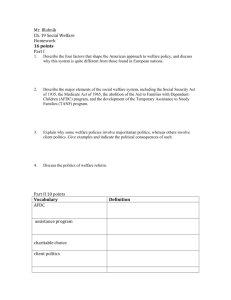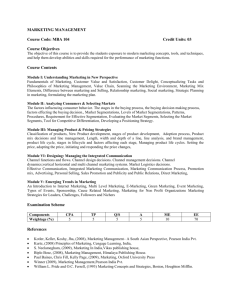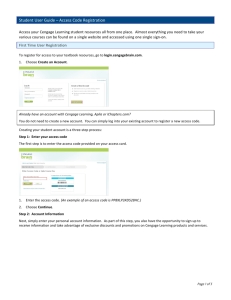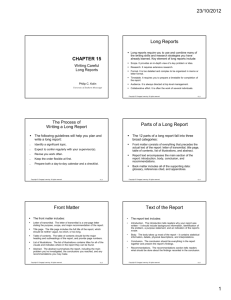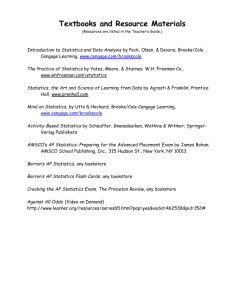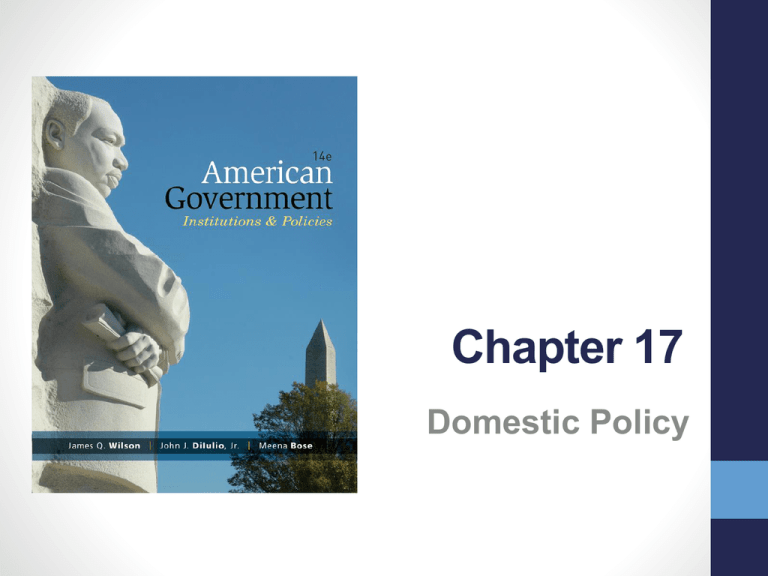
Chapter 17
Domestic Policy
1. What types of politics may matter to whether
and how government acts on any given issue?
2. How do America’s social welfare policies and
programs differ from those of many other
modern democracies?
3. Why are some social welfare policies and
programs politically protected while others are
politically imperiled?
4. Is there a political consensus about how to
address the solvency challenges facing major
social welfare programs?
Copyright © 2015 Cengage Learning. All rights reserved.
Learning Objectives
2
5. Why have government regulations on certain
big businesses been imposed over the
objections of those industries?
6. Why are environmental policies designed and
enforced differently in America than in other
industrialized nations?
7. Does just one type of politics drive
environmental policies and programs?
Copyright © 2015 Cengage Learning. All rights reserved.
Learning Objectives
3
WHO GOVERNS?
1. How, if at all, have Americans’ views of
government’s responsibility to help the“deserving
poor” changed over time?
2. Why are some government social welfare programs
politically protected while others are politically
imperiled?
TO WHAT ENDS?
1. What does the Constitution mean by “promote the
general Welfare”?
2. Who should administer federal welfare programs?
Copyright © 2015 Cengage Learning. All rights reserved.
Introduction
4
Cost vs. Benefit
Legitimacy
Perceived costs and
benefits can be:
Widely distributed
Narrowly
concentrated
Copyright © 2015 Cengage Learning. All rights reserved.
Policymaking Politics
Revisited
5
Copyright © 2015 Cengage Learning. All rights reserved.
A Way of Classifying and Explaining
the Politics of Different Policy Issues
6
“To provide for the . . . general
Welfare”
Restrict spending? OR
Meet national needs?
Copyright © 2015 Cengage Learning. All rights reserved.
Social Welfare Policy
7
From the New Deal to the New Health
Care Law
Insurance program (unemployed/elderly)
Assistance program (blind, dependent
children and aged)
Means test
Copyright © 2015 Cengage Learning. All rights reserved.
Social Welfare Policy
8
FDR and the New Deal
Social Security Act (1935)
In 1932, unemployed workers
line up at a soup kitchen
during the Great Depression.
Copyright © 2015 Cengage Learning. All rights reserved.
Social Welfare Policy
9
Johnson and the Great Society
Medicaid and Medicare (1965)
Copyright © 2015 Cengage Learning. All rights reserved.
Social Welfare Policy
10
Obama
Patient Protection and Affordable Care Act
(2010)
Copyright © 2015 Cengage Learning. All rights reserved.
Social Welfare Policy
11
Two Kinds of Social Welfare Programs
Benefits most
Most pay
No means test
Majoritarian politics
Social Security and
Medicare
Issue: cost
Benefits few
Most pay
Means tested
Client politics
TANF and SNAP
Issue: legitimacy
Copyright © 2015 Cengage Learning. All rights reserved.
Social Welfare Policy
12
Social Security and Medicare:
Majoritarian Politics
Opinion on Social Security and Medicare
Proposals, By Generation
Copyright © 2015 Cengage Learning. All rights reserved.
Social Welfare Policy
13
Copyright © 2015 Cengage Learning. All rights reserved.
Public Opinion on Changing
Medicare and Social Security
14
Social Welfare Policy in America:
Four Distinctive Features
1. More restrictive view of who is entitled to
governmental assistance
2. Slower to embrace the welfare state
3. States play a large role
4. Nongovernmental organizations play a large role
Copyright © 2015 Cengage Learning. All rights reserved.
Social Welfare Policy
15
From AFDC to TANF: Client Politics
Existing state programs
Federal government regulations governing
the programs
Public opinion changes
Temporary Assistance for Needy Families
(TANF)
Copyright © 2015 Cengage Learning. All rights reserved.
Social Welfare Policy
16
Medicaid: Client and Majoritarian
Means-tested
Benefits broader population
Interest group support
Copyright © 2015 Cengage Learning. All rights reserved.
Social Welfare Policy
17
Relationship between wealth and
power
Antitrust Laws: Majoritarian Politics
Sherman Act (1890)
Federal Trade Commission Act (1914
Clayton Act (1914)
Copyright © 2015 Cengage Learning. All rights reserved.
Business Regulation Policy
18
Labor and Occupational Health and
Safety: Interest Group Politics
Wagner Act
National Labor Relations Board
Occupational Safety and Health Act (1970)
Copyright © 2015 Cengage Learning. All rights reserved.
Business Regulation Policy
19
Agriculture Subsidies: Client Politics
Dairy farmers get
government subsidies for
their milk production.
Copyright © 2015 Cengage Learning. All rights reserved.
Business Regulation Policy
20
Consumer and Environmental
Protection: Entrepreneurial Politics
Auto safety/antipollution
Copyright © 2015 Cengage Learning. All rights reserved.
Business Regulation Policy
21
Entrepreneurial politics: Upton Sinclair’s book The Jungle, published in 1906,
shocked readers with its description of conditions in the meat-packing
industry and helped bring about passage of the Meat Inspection Act of 1906.
The Politics of “Cap and Trade”
Environmental Policy in America: Three
Distinctive Features
Adversarial
State dependent
Interest group pressures
Copyright © 2015 Cengage Learning. All rights reserved.
Environmental Policy
22
Agricultural
Pesticides:
Client Politics
Endangered Species:
Entrepreneurial
Politics
Environmental
Policy
Pollution from
Automobiles:
Majoritarian Politics
Acid Rain:
Interest Group
Politics
Copyright © 2015 Cengage Learning. All rights reserved.
Environmental Policy
23
Copyright © 2015 Cengage Learning. All rights reserved.
New Federal Safety Regulations
for Deep Water Oil Drilling
24
Click picture to play video
Taking a closer look:
1. What persons or agencies oversee
federal environmental policy?
2. How are new regulations an example
of adversarial policy?
3. Who pays for costs associated with
administering environmental regulations?
Copyright © 2015 Cengage Learning. All rights reserved.
New Federal Safety Regulations
for Deep Water Oil Drilling
25
Does just one type of politics drive
domestic policies and programs?
Which type of politics matters most on
economic policy issues?
Copyright © 2015 Cengage Learning. All rights reserved.
Beyond Domestic Policy
26

